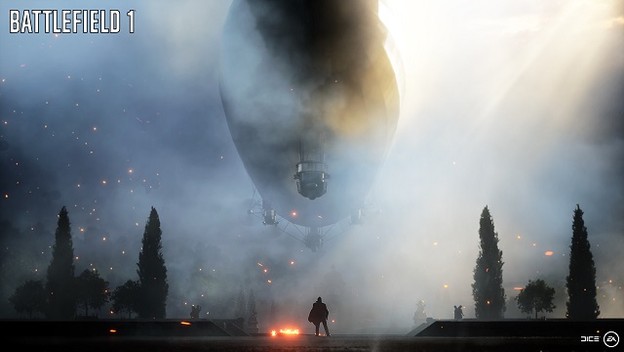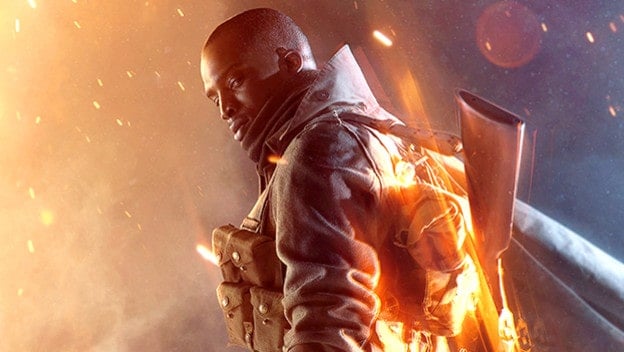The excitement over Battlefield 1 shows that the time has come to return to the world of the historical shooter. Gamers have gotten a bit tired of near- and far-future settings, making the Battlefield 1 announcement trailer break Youtube popularity records. If we’re so excited about World War I, though, why haven’t we seen more shooters set during the infamous “war to end all wars?” Well, frankly, because much of World War I was incredibly boring. It was the dawn of modern warfare, for certain, but new defensive technology stymied Europe’s armies for years. The bulk of the war in Europe was a stalemate involving muddy, depressing trench warfare. In fact, it took some doing for DICE to even convince EA to base a game on the war. And although DICE is doing some neat things like telling the stories of unsung WWI heroes like the Harlem Hellfighters, the vision of the war we’re seeing is necessarily distorted. In some ways, it tells us more about modern thinking than World War I-era attitudes.
To start with, EA has to ensure that the game will appeal to modern audiences. From the soundtrack in the announcement trailer to the eSports commentary in the multiplayer footage we saw at E3, this is not a World War I that my great-grandparents would have recognised. I suspect they’d even be rather offended by the tone of the advertising. Think of the game’s promotion in terms of military recruitment ads. You can see how they’re similar. Modern recruitment ads focus on all the cool tech you’ll be using in the military, just as the Battlefield 1 promotion is all about the weapons, tanks, and planes you’ll be using. The way the war was presented a hundred years ago, however, was rather different. Soldiers were recruited through exhortations about duty to home and country. Sure, it was portrayed as a grand adventure (especially for the US and Canadian soldiers who didn’t have the tanks running over their own neighborhoods), but in a different way. Of course World War I soldiers weren’t humorless, but people looked at and talked about warfare in a different way back then. That viewpoint is distorted in order to appeal to modern gamers.
It goes without saying that Battlefield 1 will also distort the experience of fighting in World War I because it’s a game. We’re hearing a lot about the planes, tanks, and horses we’ll be using, but there hasn’t been much talk of naval warfare (ships will be included, but will subs?), which was instrumental to the conflict. Of course, pretending to be a plucky biplane pilot soaring above the fray is a lot more exciting than pretending to be a German U-boat captain slowly stalking a civilian passenger liner in the Atlantic. And playing a melee soldier turning the tide at the end of the war is far more exciting than playing a trench soldier who spent most of his time huddling the mud, hoping not to be shelled or hit be mustard gas against which he had little defense. This isn’t new for video games – I’ve heard plenty of Iraq War vets joke about how shooters set in the modern day would be more realistic if they were mostly about paperwork – but it’s worth remembering. You’ll be playing the most exciting parts of what was often a massive slog of a war.
Even the participants in the war are being filtered through an unusual lens. If you look at any sources that list the primary combatants in the war, they’ll pit Britain, France, and Russia as the Allies against Germany, Austria-Hungary, and the Ottoman Empire as the Central Powers. Yet in Battlefield 1’s multiplayer, those three Central Powers are facing off against Britain, the United States, and Italy. France and Russia are not available. This is particularly weird because the United States only participated in the final year of World War I. Yes, it helped turn the tide of the war, but should it really be included over two countries that were far more important throughout the entire conflict? I can only assume that decision was made to attract US customers (and I have no idea why Italy is included as a choice over France or Russia), but if I were a French or Russian gamer, I’d be pretty pissed. Again, we can see that history is distorted by marketing and/or storytelling decisions.

So why are these distortions of World War I a problem? Because, almost as much as World War II, this conflict serves as a cautionary tale in our history. World War I was a miserable, plodding, largely unnecessary fight caused by a lot of poor decisions made by major world leaders. The reality of modern warfare meant something far different than having a lot of neato toys and weapons to play with. It meant a frightening number of civilian casualties. It meant the birth of modern genocide, modern guerrilla tactics, and chemical warfare. It left scars across Europe that haven’t healed to this day. Although it seems like the game’s single-player campaign might touch on some of these topics, it can’t possibly do them full justice while still being the kind of game that it is. Battlefield 1 is strongly limited by its format and intended audience, and that’s something we shouldn’t forget.
Battlefield 1 may well be an exciting game, and it’s certainly highly anticipated by many FPS fans who are tired of futuristic settings. Let’s just not make the mistake of thinking it will truly be representative of World War I. The details of the technology might be accurate, but many other things aren’t going to be – and probably shouldn’t be. Think of it instead as World War I: the Game: Loosely Based Upon a Modern Take on Hollywood’s Version of the Conflict . By all means, have a great time with Battlefield 1, but if the setting interests you at all, take some time to read more about the way everything actually went down. To EA DICE, World War I is an interesting setting in which to create an entertaining shooter, but to us as members of humanity, it’s a whole lot more than that.
